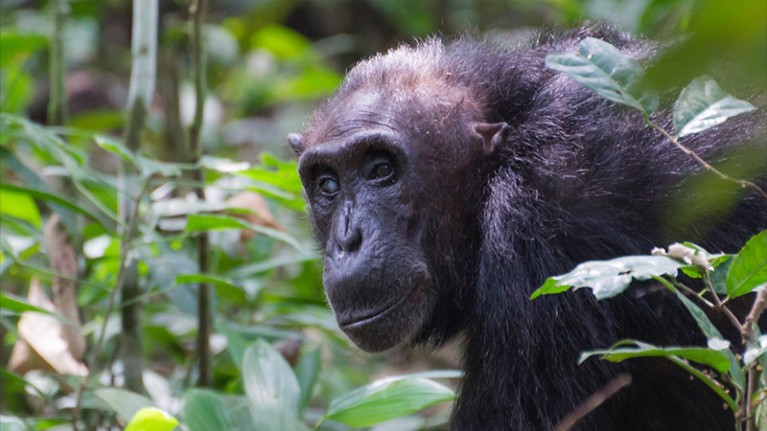Hello Nature readers, would you like to get this Briefing in your inbox free every day? Sign up here.
An older female chimpanzee (Pan troglodytes) makes her way through Kibale National Park, Uganda.Credit: Riccardo Maywald/Getty
Chimpanzees experience menopause
The females in a group of wild chimpanzees (Pan troglodytes) are the first non-human primates to be documented experiencing menopause. Toothed whales, such as orcas (Orcinus orca), are the only other wild mammals in which females are known to live long beyond their reproductive years. In captive animals, this seems to be more common: females in 6 out of 20 mammalian orders for which there are data experience cessation of ovulation. This includes European badgers (Meles meles), house mice (Mus musculus) and horses (Equus caballus). Why only some animals experience menopause is still a mystery.
Nature | 4 min read
References: Science paper & Cell paper
Rogue greenhouse gas comes from China
Efforts to curb emissions of a potent greenhouse gas, HFC-23, might be falling short. HFC-23 is a by-product of refrigerant manufacture and around 14,700 times as powerful as carbon dioxide at warming the globe. In 2020, scientists found an increase in HFC-23 that ran counter to an expected decline. Nearly half of the unexpected HFC-23 found in the atmosphere from 2015 to 2019 was traced back to factories in eastern China, despite reports to the contrary.
Nature | 5 min read
Reference: Atmospheric Chemistry and Physics paper
Why a hurricane stunned forecasters
Tropical storm Otis shocked meteorologists when it turned into the strongest hurricane to ever strike Mexico. “In moments like these, forecasters utterly failed,” says meteorologist Matt Lanza. “We must do better.” One of the reasons this took forecasters by surprise is that computer models struggle to predict rapid changes that can occur in smaller storms. Otis intensified over a small area in the Pacific Ocean, where the local winds speeds and water temperatures of 31 °C provided the ideal conditions for the storm to worsen. Scientists have warned that these situations are more likely to happen owing to climate change.
The Washington Post | 5 min read
Reader poll

Last week, we learnt that 15% of the 1,600 researchers who took part in a Nature survey use artificial intelligence (AI) tools such as ChatGPT to help them write grant proposals.
When we asked readers what they thought about using AI in this way, 44% said it’s a useful time-saving tool, although some proposed that its use should be disclosed on applications. AI could be particularly helpful to those who struggle to write polished prose. “The truly important thing here is the idea,” says professional grant writer Joanna Stavropoulou. “The writing stuff is all fluff and puff.”
More than one-third of readers agreed with robotics researcher Juan Manuel Parrilla Gutierrez, who wrote that AI exposes fatal flaws in the grant-application system: “What is the point of asking scientists to write documents that can be easily created with AI?”
Some readers felt that using AI isn’t a good idea, but not necessarily because it is cheating. “Each time I write a grant proposal, I deeply think about the true meaning of my work,” says bioscientist Michel Négrerie. “AI cannot perform such an ‘introspection’.”
Features & opinion
Meat-eating probably didn’t make us human
Scientists are poking holes in the idea that meat-eating was key to human evolution. Meat was long considered to be essential for providing the energy needed for our large brains. But “proteins alone do not have a particularly high calorific value”, says evolution researcher Lutz Kindler. What makes us human might instead be our enormous metabolic adaptability. “Humans, unlike many other animals, are able to extract from different food sources in their environment what ensures their survival,” explains nutritional-medicine specialist Hans Hauner.
Scientific American | 8 min read
Five best science books this week
Andrew Robinson’s pick of the top five science books to read this week includes a deeply researched study of numbers, a thrilling discussion of volcanoes and an authoritative natural history of beetles accompanied by 300 exquisite photographs.
Nature | 4 min read
Futures: Forward, backward
A mother discovers the perils of living in the past in the latest short story for Nature’s Futures series.
Nature | 6 min read
Podcast: AI listens to forest recovery
An AI tool that analyses tropical forest soundscapes helps scientists to measure biodiversity. It’s a cost-effective way to estimate wildlife recovery automatically. This could, for example, help to award biodiversity credits, paid by companies or governments to landowners for restoring forests. Collecting sound data would allow close monitoring of these efforts: “We can say exactly you are more close now to the primaeval forest by 20%,” conservation ecologist and study co-author Jörg Müller tells the Nature Podcast.
Nature Podcast | 25 min listen
Subscribe to the Nature Podcast on Apple Podcasts, Google Podcasts or Spotify, or use the RSS feed.
